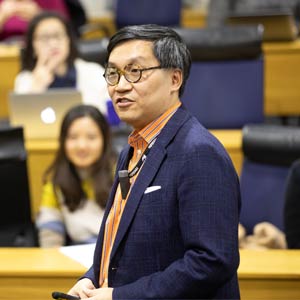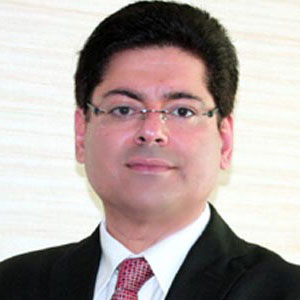THANK YOU FOR SUBSCRIBING

Smart Urbanism and an All-Digital Economy as Necessity, Not a Futuristic Dream
Benson Tam, Founding Partner and Chairman, Venturous Group


Benson Tam, Founding Partner and Chairman, Venturous Group
In recent years, we have seen the birth and development of many new smart technologies that promise to change how the world lives, works, and plays.
While many countries are working toward building smarter services that tap into technologies such as machine learning, intelligent automation, and blockchain, all of us at Venturous Group see the opportunity of creating an all-digital economy in China by transforming its cities into safer, faster, and more liveable smart cities and towns. China is uniquely positioned to be the world’s first all-digital economy, driven by the proliferation of 5G technology, and the continued growth and demand of smart apps, e-commerce, and mobile payments. It is the world’s no.1 IoT market.
New technologies have paved the way for advancements across several sectors, including healthcare, transportation, energy, and government services. If we, together with strategic partners and investors, can catalyze the shift towards a fully smart ecosystem, we would be able to improve the quality of life for people, as well as create a sustainable way of living to benefit the environment.
Smart Cities For Greener, Safer, And Faster Living
We recognise there is a need to democratize technology access so that more people can benefit from new solutions. But we also have to think bigger.
The smart city concept is not new. Pioneering efforts in smart city development were very much about the commercialisation of technology and creating standalone vertical applications. We are now in the phase of smart city 2.0, which is driven by government initiatives and advancements in data sharing, network building, and public engagement. We now look forward to smart city 3.0. In this new world, it is imperative not to innovate in isolation, but to collectively create an integrated system that would enable different players to work seamlessly together.
All of the technologies we need to build a smart city exists, but what we need to drive this vision forward is a Smart City OS (operating system)—a solution that would unify different technologies for greater synergies and efficiencies.
One simple way to look at it is with transport. Ridesharing service Didi is already experimenting with smart routing through artificial intelligence (AI). What if an app could, through talking to other transport and urban infrastructure services, simply tell you what time you need to leave the house in order to make a morning meeting?
From a more complex medical standpoint, your mobile phone could automatically trigger multiple responses through a single app, or simply if the user falls down with the phone in his pocket. Emergency services could be called, medical records could be transferred immediately to the hospital, and the traffic lights could be green all the way for a speedy journey.
This vision requires strategic partnerships and investments to build first-in-class digital infrastructure and integrate spaces, hardware, and software to connect everyone, everything, everywhere in a sustainable future-focused way. As we look to transform China’s cities, we have identified several areas to invest in.
As we look to transform China’s cities, we have identified several areas to invest in.
We need to work with partners to build out a system that would adapt and grow with the adoption of 5G service networks. This will bring about the creation of new smart city devices, apps, and a host of new business models, heralding the dawn of a new IoT era of increased automation, robotics, AI, and enhanced cloud computing.
It is essential to facilitate the digitalization of traditional industries, such as energy, finance, and healthcare services, which are key to fully integrating city operations. A key sector for us is energy. What a smart city needs to function sustainably is an energy management system that would use big data, AI and cloud technologies for energy cost savings and reduce energy consumption. We have recently invested in a smart energy company which has such a system, which, once rolled out on a much bigger scale, will have a tremendous positive impact on the environment.
An increasingly connected China will see new consumer lifestyles and new professions, with new demands in e-commerce and retail. I look at this positively. With greater integration and digitalization, traditional jobs will continue to pivot to embrace new technologies. A nurse today could be quite different from a nurse tomorrow. Smart city integration will enable the development of digital nurses who can care for more people through the convenience of a mobile device – which everyone already owns today.
As consumers embrace change and look to improve their own lives and establish financial security for themselves, the area of FinTech is also of great importance. We have invested in a FinTech company that is transforming wealth management through disruptive technology such as blockchain that will enhance the speed, safety and security of financial services.
Data and technology – a force for good
As we look to improve quality of life, we recognise the importance of smart city applications, especially in areas such as healthcare and safety.
Data collection is key to understanding behaviors, interests, and needs in order to dispense the appropriate real-time solutions.
It has become essential in times of crises too, and the advantages of a digitalised world are clear.
During this Covid-19 pandemic, we have witnessed several examples of how smart technology is used as a force for good. Disinfecting drones and food-and-medicine delivery robots are deployed to safeguard healthcare workers. New mobile apps and cellular location data are used to facilitate contact tracing.
There is a fine line to be walked between retaining a level of privacy and sharing data for national safety and security.
China has in recent years heeded public calls to protect its consumers and accelerate privacy legislation.
The country’s cybersecurity laws have been modelled closely to the European Union’s (EU) General Data Protection Regulation (GDPR), with some exceptions to promote national security and advance e-commerce, which accounts for a significant part of China’s economy. This flexibility puts China’s data protection model in between the strict GDPR and the more flexible US model, which features some measure of implied consent with the option to opt-in or opt-out of data sharing.
Ultimately, the choice of data sharing should to the largest extent possible belong to the individual user. The “opt-in” feature is key.
With the pandemic, the sharing of medical information has proven to aid several national containment efforts. When users have trust in their government and have the option to share select data when necessary, smart technology becomes an essential tool to enable an entire city or nation to work together for the common good.
An intelligent, connected ecosystem has the potential to solve some of our city’s, and even the world’s greatest challenges.
As a strategic capital group, Venturous Group is working with different partners, as well as investors, to bring to life the vision of transforming China’s cities into Smart Cities.
We believe in powering an all-digital economy so that everyone has a chance to live a better life.
Benson Tam is the Founding Partner and Chairman of Venturous Group, a strategic capital group powering an all-digital urban transformation of China to transform cities into Smart Cities in China to improve quality of life, environment and society.












